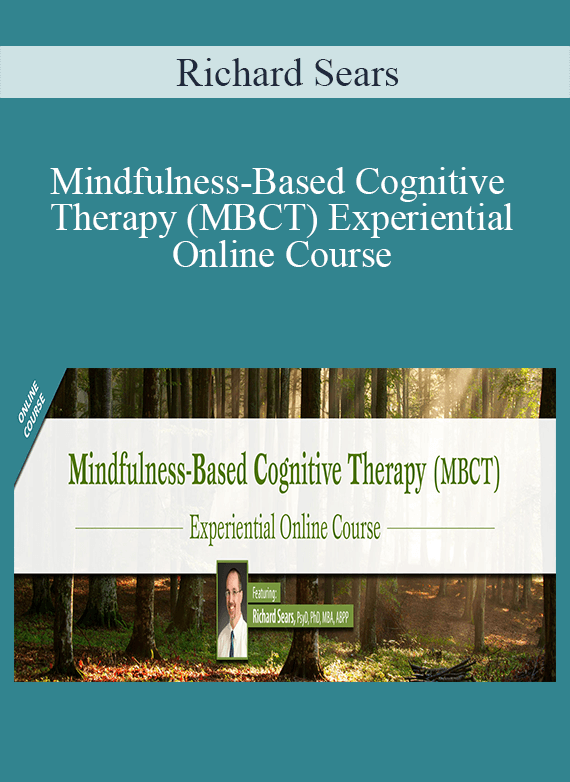Richard Sears – Mindfulness-Based Cognitive Therapy (MBCT) Experiential Online Course
$149.00 Original price was: $149.00.$44.00Current price is: $44.00.
Digital Download: You will receive a download link via your order email
Should you have any questions, please contact us: [email protected]
 Richard Sears – Mindfulness-Based Cognitive Therapy (MBCT) Experiential Online Course
Richard Sears – Mindfulness-Based Cognitive Therapy (MBCT) Experiential Online Course
Mindfulness will offer your client a better quality of life…if you can effectively integrate it into your practice.
But like many clinicians, you might be frustrated with mindfulness because you don’t have concrete, practical ways to incorporate it for specific situations and symptoms such as PTSD, anxiety, chronic pain, addictions, and depression.
This is the course that will finally teach you exactly how to combine mindfulness and cognitive therapy techniques, to transform your practice—and your life.
Join expert trainer Dr. Richard Sears for a unique online experiential course to master the evidence-based Mindfulness-Based Cognitive Therapy (MBCT) approach. He’ll guide you through the core competencies using passion, humor, and wisdom from his 30 years of teaching mindfulness.
Through four comprehensive and experiential video modules, you’ll immerse yourself in the entire step-by-step 8-session structured program to use with both individual clients or group therapy.
End this course with the complete framework for integrating advanced, clinical mindfulness strategies in your very next session.
Here’s what you’ll learn to do in this training…
- Enhance therapeutic efficiency and outcomes by understanding the mechanisms that make mindfulness techniques effective for stress, depression, anxiety, trauma, pain, and addiction.
- Stop rumination thoughts and behaviors in clients by breaking down the role of thoughts in perpetuating symptoms of stress, anxiety, and depression.
- Engage your clients with understandable explanations of how the brain changes with mindfulness practice.
- Refine the evidence-based principles of Cognitive-Behavioral Therapy (CBT) by integrating mindfulness practice.
- Alleviate clients of intrusive, obsessive-compulsive thoughts by incorporating mindfulness practices into traditional CBT thought records.
- Help clients disengage from the narrative of negative thoughts and emotions through specific mindfulness-based techniques.
- Organize the eight-session MBCT program for use in your own clinical setting.
- Avoid clients’ cycles of struggling with distressing thoughts and feelings by learning to guide clients through a 3-minute mindfulness exercise.
- Reduce worry and rumination using decentering skills.
- Help clients quickly internalize the skills and attitudes that allow them to let go of struggle and make conscious choices by applying the 3 steps of the mindful inquiry process.
- Adapt the MBCT curriculum to different client populations, including children, as it relates to treatment considerations.
- Foundations of MBCT: Going beyond Mindfulness-Based Stress Reduction (MBSR)
- Neurological evidence for MBCT
- Principles of MBCT, including adaptation and expansion of CBT principles and mindful inquiry
- Raisin exercise — distinguish thinking and feeling
- Body scan — foundation to build attention
- Mindfulness of daily activities
- ABC model for linking thoughts and emotions
- Pleasant events calendar to foster attention to the positive
- Mindful breathing for stress and focus
- Mindful stretching for working with discomfort
- Mindful walking for dynamic mindfulness
- Unpleasant events calendar to relate differently to difficulty
- 3-Minute breathing space
- Mindfulness of breath, body, sounds to deepen awareness
- Working with difficulties without struggle
- Exposure to difficult thoughts and feelings to transform them
- Notice thoughts without getting lost in them
- Purposefully exposing to strong thoughts and feelings
- Techniques for working wisely with difficult thoughts
- Recognize relapse signatures to prevent future problems
- Develop self-care action plans
- Personalize mindfulness practices for individual clients
- Maintain momentum of positive gains
- Adaptations of MBCT for depression, stress, anxiety, chronic pain, PTSD, substance use disorders, children & adolescents
Who is this training for?
Meet Your Course Expert

Richard Sears, PsyD, PhD, MBA, ABPP, is a licensed psychologist in Cincinnati, Ohio, board certified in clinical psychology by the American Board of Professional Psychology (ABPP), runs a private psychology and consultation practice, and is the Director of the Center for Clinical Mindfulness & Meditation. He is also a clinical assistant professor at Wright State University School of Professional Psychology, clinical/research faculty at the UC Center for Integrative Health and Wellness, volunteer associate professor of Psychiatry & Behavioral Neurosciences at the UC College of Medicine, and a research/psychologist contractor with the Cincinnati VA Medical Center.
His most recent books include Mindfulness: Living Through Challenges and Enriching Your Life in this Moment (Wiley-Blackwell); Perspectives on Spirituality and Religion in Psychotherapy (PR Press); Building Competence in Mindfulness-Based Cognitive Therapy (Routledge); and Mindfulness-Based Cognitive Therapy for PTSD (Wiley-Blackwell). Dr. Sears is the lead author of Mindfulness in Clinical Practice (PR Press) and Consultation Skills for Mental Health Professionals (Wiley).
Dr. Sears is a fifth-degree black belt in Ninjutsu, and once served as a personal protection agent for the Dalai Lama with his teacher, Stephen K. Hayes. He has studied the Eastern Wisdom traditions for over 30 years, receiving ordination in three traditions, and authority to teach Zen koans (inka).
Financial: Richard Sears is core faculty for Union Institute and University. He receives a speaking honorarium from PESI, Inc.
Non-financial: Richard Sears is a member of the American Board of Professional Psychology; American Academy of Clinical Psychology; and the American Psychological Association.
Sale Page: https://catalog.pesi.com/sales/bh_c_001281_mbctexperiential_102418_organic-85885
Archive: https://archive.fo/GO0km
Delivery Method
Be the first to review “Richard Sears – Mindfulness-Based Cognitive Therapy (MBCT) Experiential Online Course” Cancel reply
Related Products
Medical & Health
Richard Sears – Cognitive Behavioral Therapy and Mindfulness: An Integrative Evidence-Based Approach
Medical & Health
Medical & Health
Richard Sears – CBT for Cluster B Personality Disorders: Techniques and Strategies You Need to Know
Medical & Health
Medical & Health
Medical & Health
Richard Sears – 2-Day Experiential Course: MBCT From Start to Finish
Hypnosis & NLP













Reviews
There are no reviews yet.